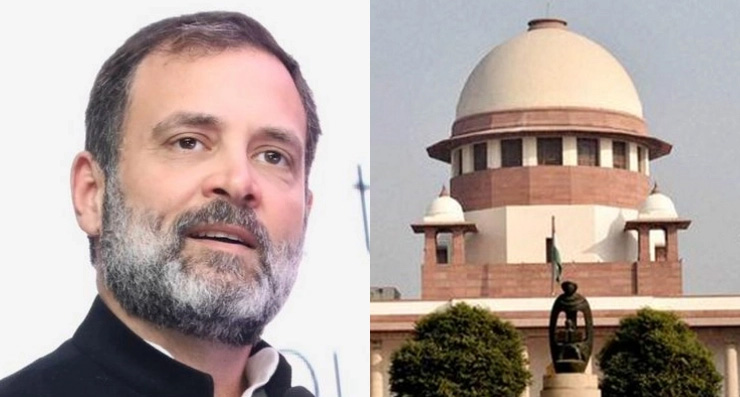Supreme Court stays Rahul Gandhi’s conviction in Modi surname defamation case, restores MP status
The Supreme Court on Friday stayed Rahul Gandhi’s conviction in a 2019 criminal defamation case over his “Modi surname” remark, restoring his status as a member of Parliament. The stay will also allow him to contest the national elections due next year.
Pronouncing the verdict, Justice BR Gavai said the ramifications of Gandhi’s conviction are wide since it will also affect the right of the electorates who elected him.
“No reason has been given by the trial judge for imposing maximum sentence, the order of conviction needs to be stayed pending final adjudication,” the bench said.
Purnesh Modi, a former minister in the Gujarat government, had filed a criminal defamation case in 2019 against Gandhi over his “How come all thieves have Modi as the common surname?” remark made during an election rally at Kolar in Karnataka on April 13, 2019.
Representing Gandhi, senior advocate Abhishek Manu Singhvi contended that the case filed by BJP MLA Purnesh Modi was “strange” against the Congress leader was strange since not a single person he had named during his speech sued.
“Interestingly, everybody who is aggrieved in this very ‘small’ community of 13 crores, only people suing are BJP office-holders. Very strange,” he said.
“In that 13 crore, there is no uniformity, homogeneity, identifiability, no boundary line…That is first point. Second is that [Purnesh Modi] himself said that his original surname was not Modi,” he added, as reported by Live Law.
Senior advocate Mahesh Jethmalani, appearing for Purnesh Modi, said that the petitioner must have a very strong point for the court to negate the sentence without reassessing evidence since the appeal is pending before the sessions court.
Justice BR Gavai mulled whether the Wayanad constituency being unrepresented due to the petitioner’s conviction was a relevant factor, saying the right of an electorate was being affected. Gavai said that the trial judge has to explain why he granted the maximum sentence.
“One of the factors is .. if a constituency in parliament goes unrepresented, is it not a ground? There is no whisper by the trial judge for the need to impose the maximum sentence. You are not only affecting the right of one individual but an entire electorate of a constituency,” Justice Gavai said, as per Bar and Bench.
In an affidavit filed before the top court, Rahul Gandhi once again refused to apologise for his Modi surname remark that led to his conviction in the defamation case and subsequent disqualification from the Parliament but urged the Supreme Court to stay his conviction asserting he is not guilty.
“Using the criminal process and the consequences under Representation of People Act to arm twist the Petitioner into apologising for no fault is gross abuse of the judicial process and ought not to be countenanced by this Court.
“The petitioner maintains and has always maintained that he is not guilty of offence and that the conviction is unsustainable and if he had to apologise and compound the offence, he would have done it much earlier,” Gandhi said in the affidavit.


Comments are closed.